Crisis Management Strategies for Hospitality: COVID-19 Impact
VerifiedAdded on 2023/06/09
|23
|5767
|76
Report
AI Summary
This research report investigates crisis management practices within the hospitality industry, specifically examining how Rosewood London responded to the COVID-19 pandemic. The report begins with an introduction outlining the research aims, objectives, and questions, followed by a literature review exploring crisis management concepts and the challenges faced by the hospitality sector during the pandemic. The research then delves into the methodology employed, followed by an analysis of the findings, which likely includes the challenges faced by Rosewood London, the crisis management strategies implemented, and their effectiveness. The report concludes with recommendations for future work and suggestions, offering insights into how the hospitality sector can better prepare for and manage future crises. The study highlights the importance of effective crisis management plans in mitigating the adverse impacts of unforeseen events, such as the COVID-19 pandemic, on revenue, customer relations, and overall business sustainability. The report provides a detailed analysis of the challenges faced by Rosewood London and the strategies it employed to navigate the crisis.
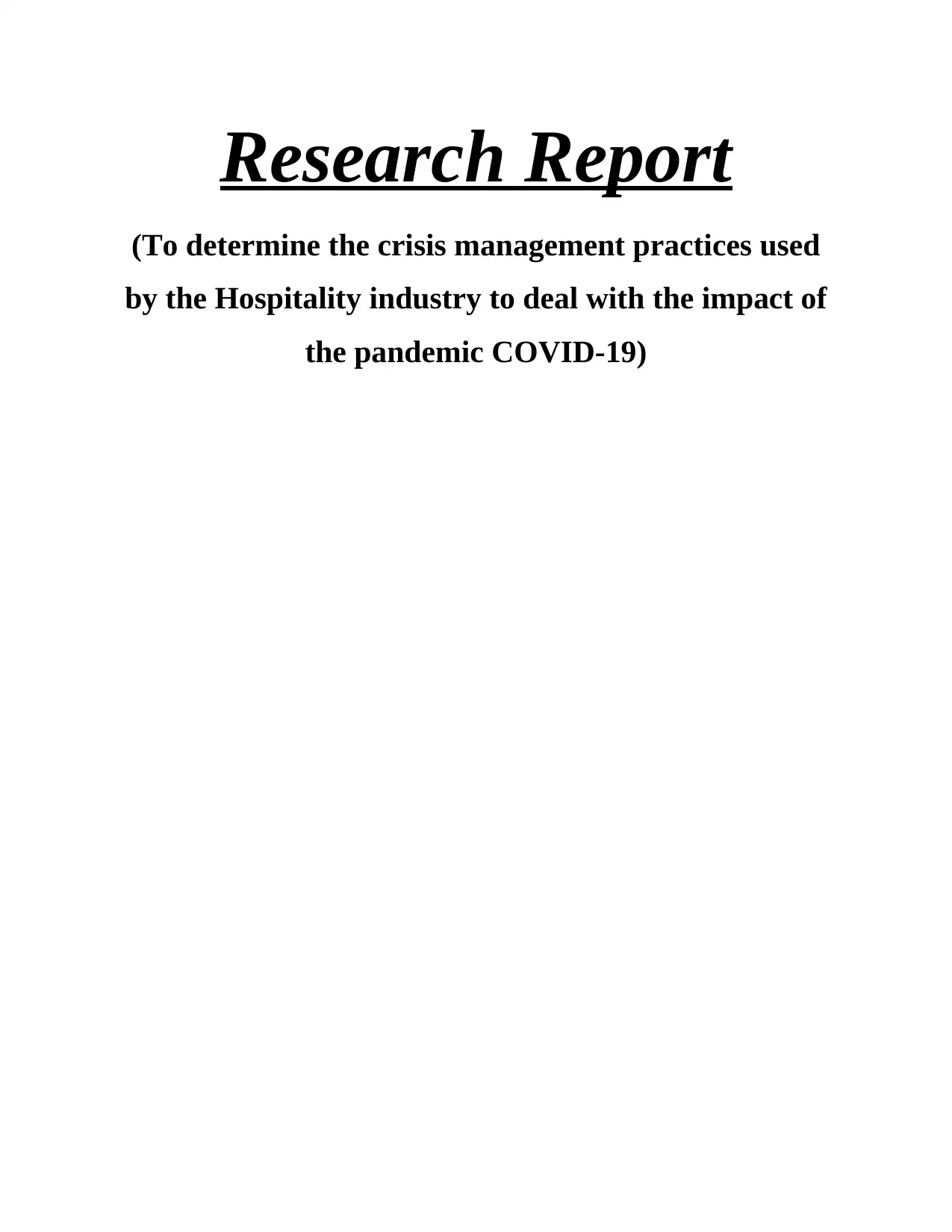
Research Report
(To determine the crisis management practices used
by the Hospitality industry to deal with the impact of
the pandemic COVID-19)
(To determine the crisis management practices used
by the Hospitality industry to deal with the impact of
the pandemic COVID-19)
Paraphrase This Document
Need a fresh take? Get an instant paraphrase of this document with our AI Paraphraser
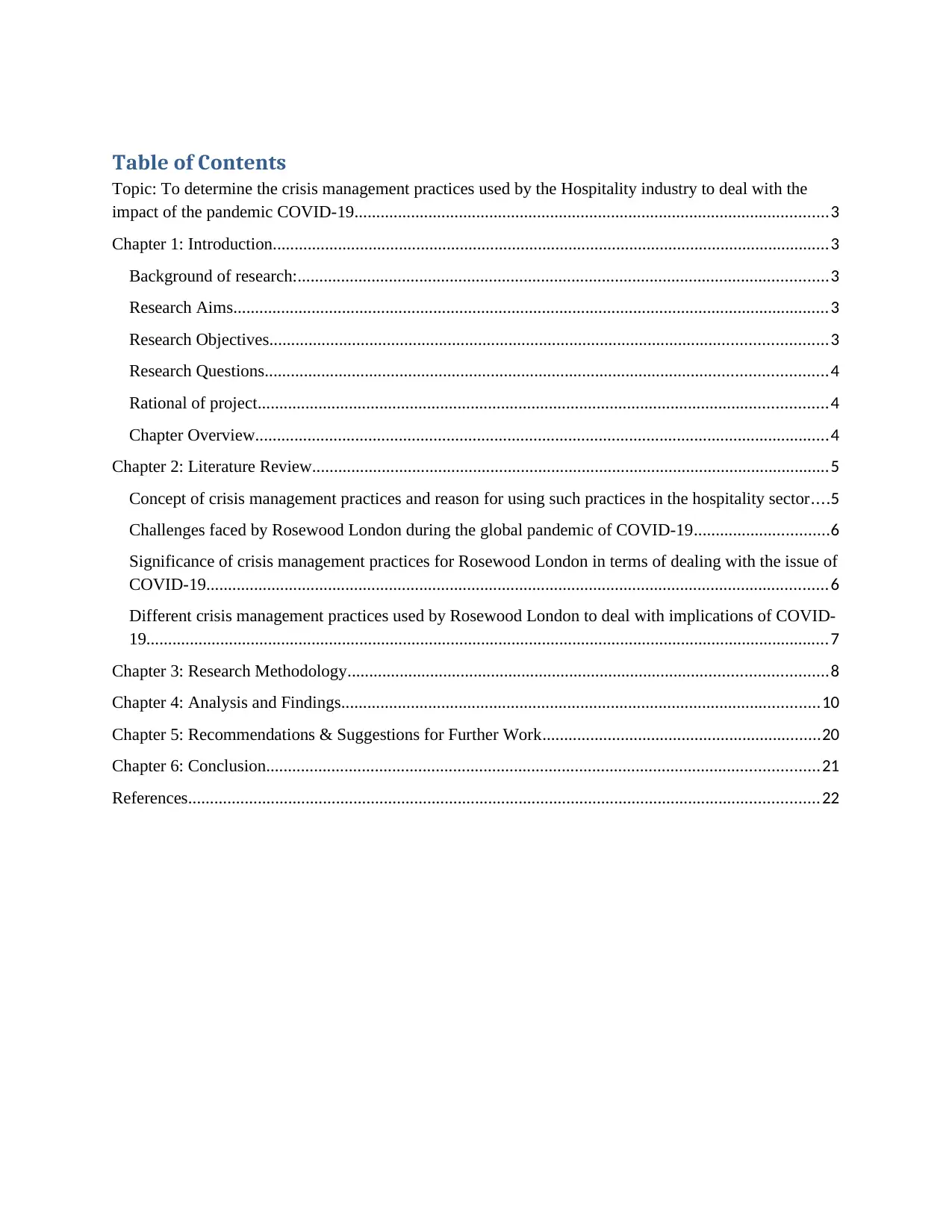
Table of Contents
Topic: To determine the crisis management practices used by the Hospitality industry to deal with the
impact of the pandemic COVID-19.............................................................................................................3
Chapter 1: Introduction................................................................................................................................3
Background of research:..........................................................................................................................3
Research Aims.........................................................................................................................................3
Research Objectives................................................................................................................................3
Research Questions.................................................................................................................................4
Rational of project...................................................................................................................................4
Chapter Overview....................................................................................................................................4
Chapter 2: Literature Review.......................................................................................................................5
Concept of crisis management practices and reason for using such practices in the hospitality sector....5
Challenges faced by Rosewood London during the global pandemic of COVID-19...............................6
Significance of crisis management practices for Rosewood London in terms of dealing with the issue of
COVID-19...............................................................................................................................................6
Different crisis management practices used by Rosewood London to deal with implications of COVID-
19.............................................................................................................................................................7
Chapter 3: Research Methodology..............................................................................................................8
Chapter 4: Analysis and Findings..............................................................................................................10
Chapter 5: Recommendations & Suggestions for Further Work................................................................20
Chapter 6: Conclusion...............................................................................................................................21
References.................................................................................................................................................22
Topic: To determine the crisis management practices used by the Hospitality industry to deal with the
impact of the pandemic COVID-19.............................................................................................................3
Chapter 1: Introduction................................................................................................................................3
Background of research:..........................................................................................................................3
Research Aims.........................................................................................................................................3
Research Objectives................................................................................................................................3
Research Questions.................................................................................................................................4
Rational of project...................................................................................................................................4
Chapter Overview....................................................................................................................................4
Chapter 2: Literature Review.......................................................................................................................5
Concept of crisis management practices and reason for using such practices in the hospitality sector....5
Challenges faced by Rosewood London during the global pandemic of COVID-19...............................6
Significance of crisis management practices for Rosewood London in terms of dealing with the issue of
COVID-19...............................................................................................................................................6
Different crisis management practices used by Rosewood London to deal with implications of COVID-
19.............................................................................................................................................................7
Chapter 3: Research Methodology..............................................................................................................8
Chapter 4: Analysis and Findings..............................................................................................................10
Chapter 5: Recommendations & Suggestions for Further Work................................................................20
Chapter 6: Conclusion...............................................................................................................................21
References.................................................................................................................................................22
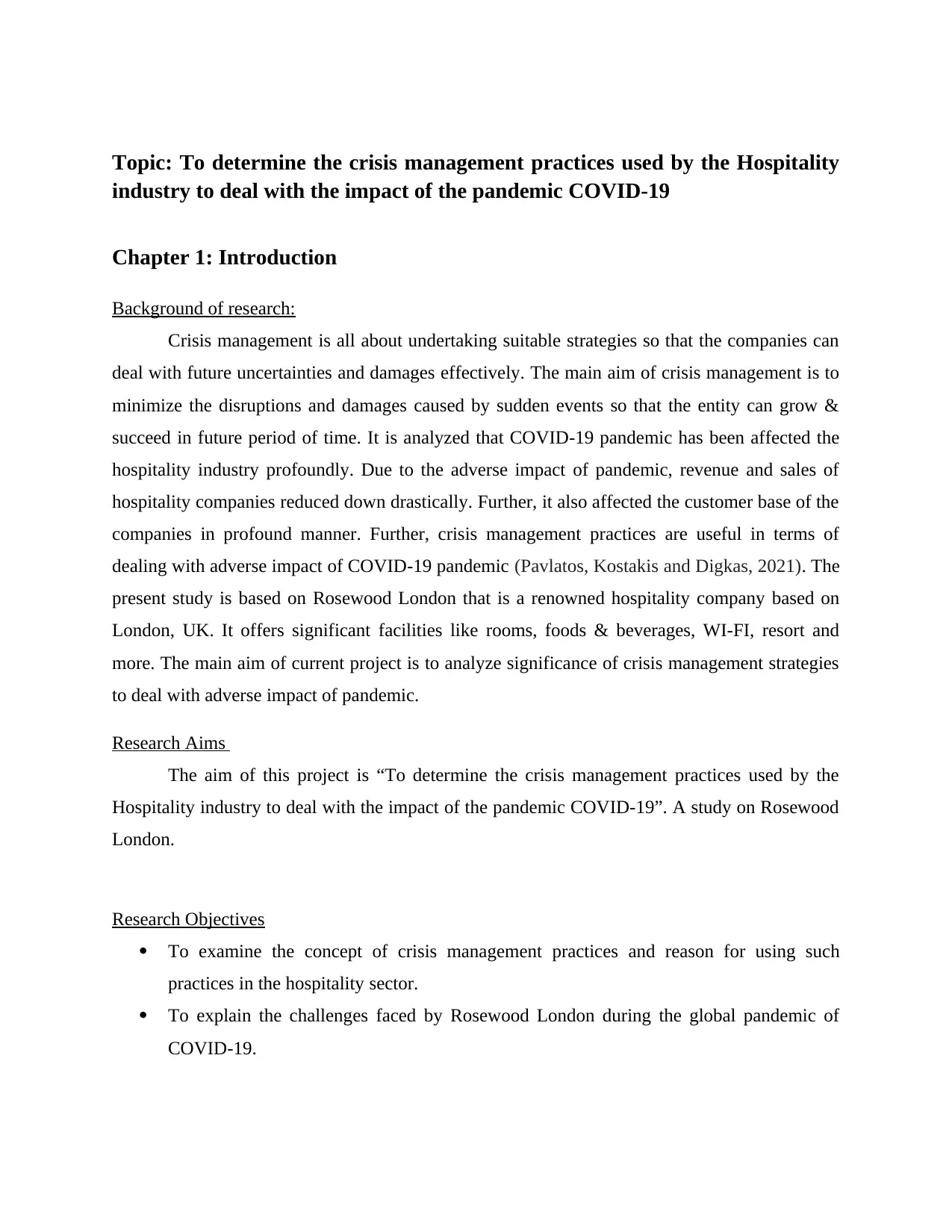
Topic: To determine the crisis management practices used by the Hospitality
industry to deal with the impact of the pandemic COVID-19
Chapter 1: Introduction
Background of research:
Crisis management is all about undertaking suitable strategies so that the companies can
deal with future uncertainties and damages effectively. The main aim of crisis management is to
minimize the disruptions and damages caused by sudden events so that the entity can grow &
succeed in future period of time. It is analyzed that COVID-19 pandemic has been affected the
hospitality industry profoundly. Due to the adverse impact of pandemic, revenue and sales of
hospitality companies reduced down drastically. Further, it also affected the customer base of the
companies in profound manner. Further, crisis management practices are useful in terms of
dealing with adverse impact of COVID-19 pandemic (Pavlatos, Kostakis and Digkas, 2021). The
present study is based on Rosewood London that is a renowned hospitality company based on
London, UK. It offers significant facilities like rooms, foods & beverages, WI-FI, resort and
more. The main aim of current project is to analyze significance of crisis management strategies
to deal with adverse impact of pandemic.
Research Aims
The aim of this project is “To determine the crisis management practices used by the
Hospitality industry to deal with the impact of the pandemic COVID-19”. A study on Rosewood
London.
Research Objectives
To examine the concept of crisis management practices and reason for using such
practices in the hospitality sector.
To explain the challenges faced by Rosewood London during the global pandemic of
COVID-19.
industry to deal with the impact of the pandemic COVID-19
Chapter 1: Introduction
Background of research:
Crisis management is all about undertaking suitable strategies so that the companies can
deal with future uncertainties and damages effectively. The main aim of crisis management is to
minimize the disruptions and damages caused by sudden events so that the entity can grow &
succeed in future period of time. It is analyzed that COVID-19 pandemic has been affected the
hospitality industry profoundly. Due to the adverse impact of pandemic, revenue and sales of
hospitality companies reduced down drastically. Further, it also affected the customer base of the
companies in profound manner. Further, crisis management practices are useful in terms of
dealing with adverse impact of COVID-19 pandemic (Pavlatos, Kostakis and Digkas, 2021). The
present study is based on Rosewood London that is a renowned hospitality company based on
London, UK. It offers significant facilities like rooms, foods & beverages, WI-FI, resort and
more. The main aim of current project is to analyze significance of crisis management strategies
to deal with adverse impact of pandemic.
Research Aims
The aim of this project is “To determine the crisis management practices used by the
Hospitality industry to deal with the impact of the pandemic COVID-19”. A study on Rosewood
London.
Research Objectives
To examine the concept of crisis management practices and reason for using such
practices in the hospitality sector.
To explain the challenges faced by Rosewood London during the global pandemic of
COVID-19.
⊘ This is a preview!⊘
Do you want full access?
Subscribe today to unlock all pages.

Trusted by 1+ million students worldwide
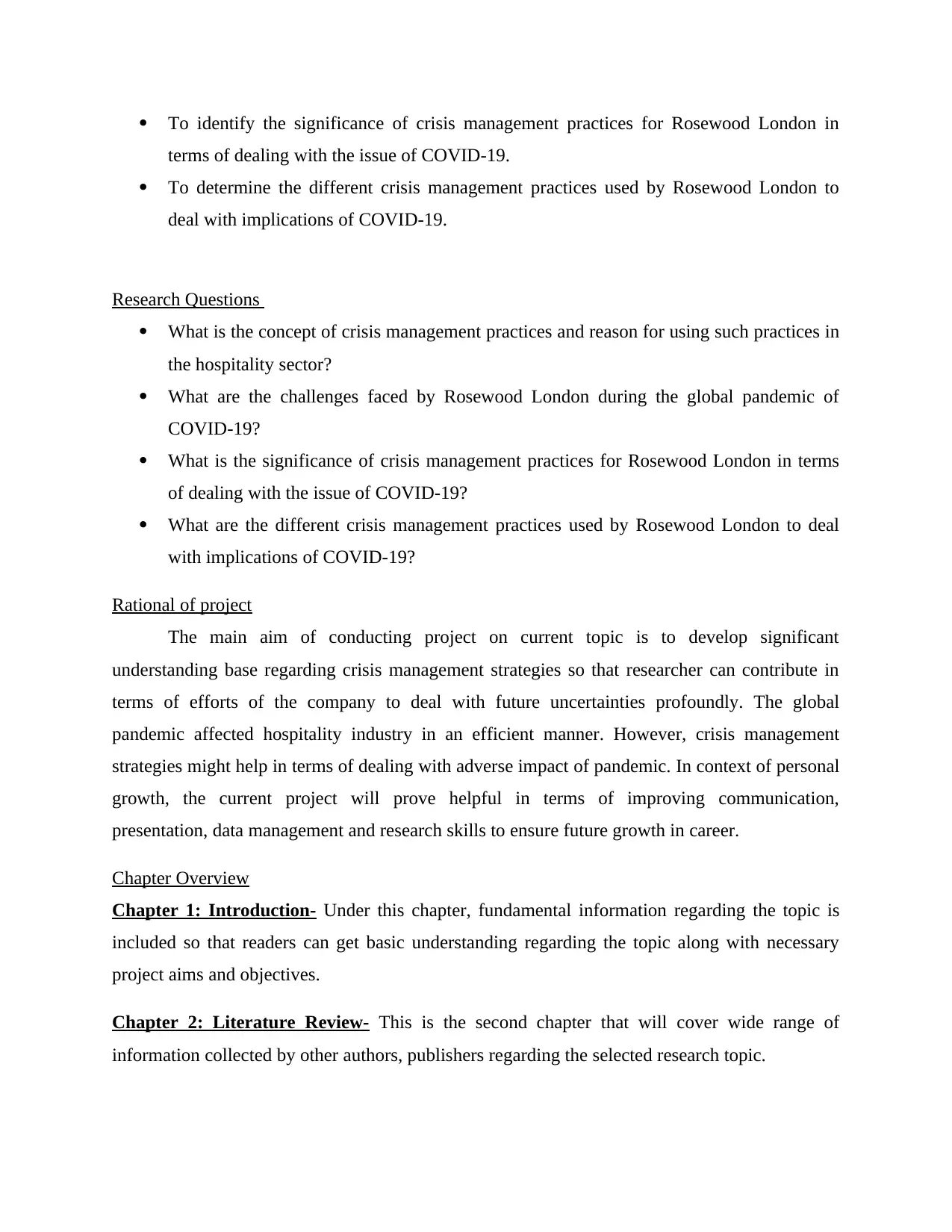
To identify the significance of crisis management practices for Rosewood London in
terms of dealing with the issue of COVID-19.
To determine the different crisis management practices used by Rosewood London to
deal with implications of COVID-19.
Research Questions
What is the concept of crisis management practices and reason for using such practices in
the hospitality sector?
What are the challenges faced by Rosewood London during the global pandemic of
COVID-19?
What is the significance of crisis management practices for Rosewood London in terms
of dealing with the issue of COVID-19?
What are the different crisis management practices used by Rosewood London to deal
with implications of COVID-19?
Rational of project
The main aim of conducting project on current topic is to develop significant
understanding base regarding crisis management strategies so that researcher can contribute in
terms of efforts of the company to deal with future uncertainties profoundly. The global
pandemic affected hospitality industry in an efficient manner. However, crisis management
strategies might help in terms of dealing with adverse impact of pandemic. In context of personal
growth, the current project will prove helpful in terms of improving communication,
presentation, data management and research skills to ensure future growth in career.
Chapter Overview
Chapter 1: Introduction- Under this chapter, fundamental information regarding the topic is
included so that readers can get basic understanding regarding the topic along with necessary
project aims and objectives.
Chapter 2: Literature Review- This is the second chapter that will cover wide range of
information collected by other authors, publishers regarding the selected research topic.
terms of dealing with the issue of COVID-19.
To determine the different crisis management practices used by Rosewood London to
deal with implications of COVID-19.
Research Questions
What is the concept of crisis management practices and reason for using such practices in
the hospitality sector?
What are the challenges faced by Rosewood London during the global pandemic of
COVID-19?
What is the significance of crisis management practices for Rosewood London in terms
of dealing with the issue of COVID-19?
What are the different crisis management practices used by Rosewood London to deal
with implications of COVID-19?
Rational of project
The main aim of conducting project on current topic is to develop significant
understanding base regarding crisis management strategies so that researcher can contribute in
terms of efforts of the company to deal with future uncertainties profoundly. The global
pandemic affected hospitality industry in an efficient manner. However, crisis management
strategies might help in terms of dealing with adverse impact of pandemic. In context of personal
growth, the current project will prove helpful in terms of improving communication,
presentation, data management and research skills to ensure future growth in career.
Chapter Overview
Chapter 1: Introduction- Under this chapter, fundamental information regarding the topic is
included so that readers can get basic understanding regarding the topic along with necessary
project aims and objectives.
Chapter 2: Literature Review- This is the second chapter that will cover wide range of
information collected by other authors, publishers regarding the selected research topic.
Paraphrase This Document
Need a fresh take? Get an instant paraphrase of this document with our AI Paraphraser
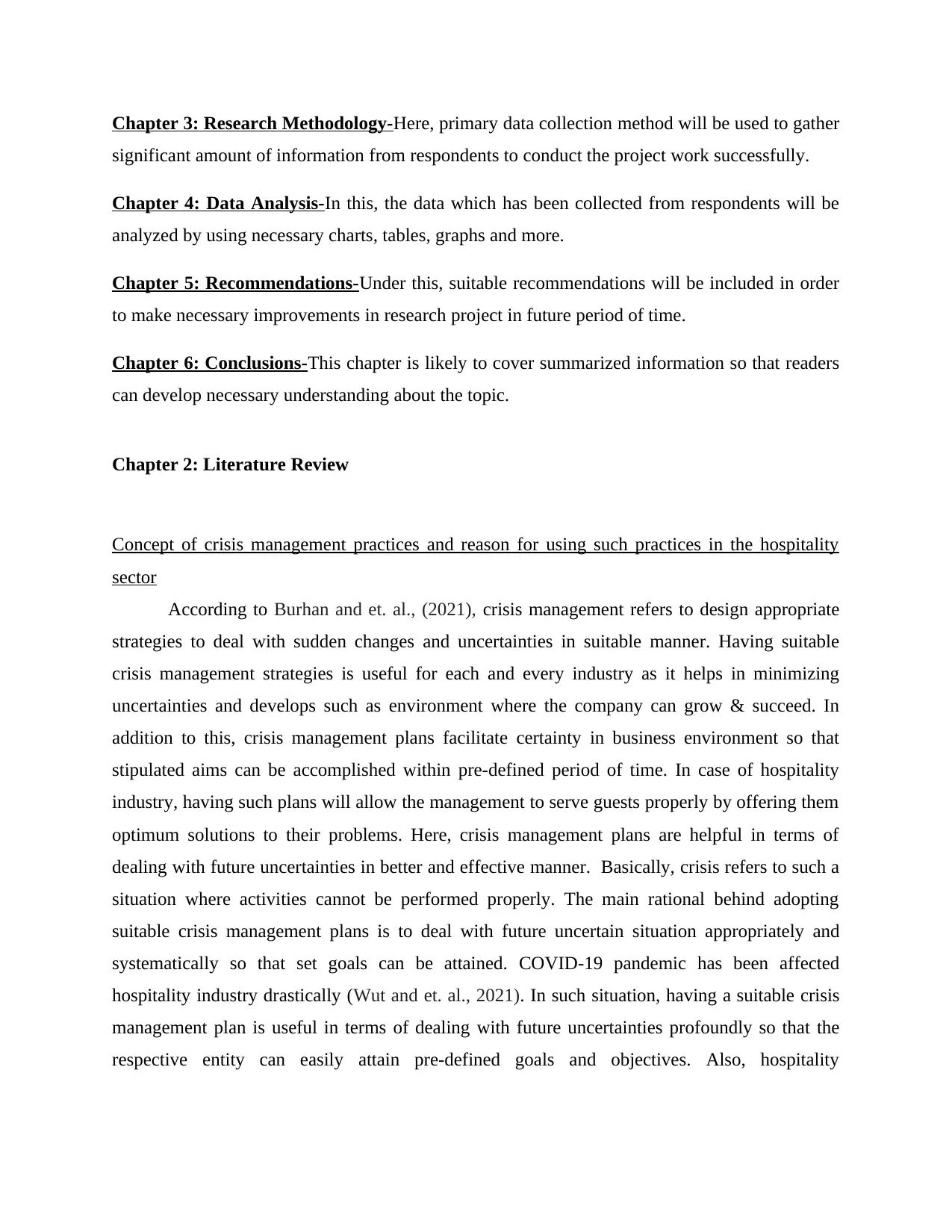
Chapter 3: Research Methodology-Here, primary data collection method will be used to gather
significant amount of information from respondents to conduct the project work successfully.
Chapter 4: Data Analysis-In this, the data which has been collected from respondents will be
analyzed by using necessary charts, tables, graphs and more.
Chapter 5: Recommendations-Under this, suitable recommendations will be included in order
to make necessary improvements in research project in future period of time.
Chapter 6: Conclusions-This chapter is likely to cover summarized information so that readers
can develop necessary understanding about the topic.
Chapter 2: Literature Review
Concept of crisis management practices and reason for using such practices in the hospitality
sector
According to Burhan and et. al., (2021), crisis management refers to design appropriate
strategies to deal with sudden changes and uncertainties in suitable manner. Having suitable
crisis management strategies is useful for each and every industry as it helps in minimizing
uncertainties and develops such as environment where the company can grow & succeed. In
addition to this, crisis management plans facilitate certainty in business environment so that
stipulated aims can be accomplished within pre-defined period of time. In case of hospitality
industry, having such plans will allow the management to serve guests properly by offering them
optimum solutions to their problems. Here, crisis management plans are helpful in terms of
dealing with future uncertainties in better and effective manner. Basically, crisis refers to such a
situation where activities cannot be performed properly. The main rational behind adopting
suitable crisis management plans is to deal with future uncertain situation appropriately and
systematically so that set goals can be attained. COVID-19 pandemic has been affected
hospitality industry drastically (Wut and et. al., 2021). In such situation, having a suitable crisis
management plan is useful in terms of dealing with future uncertainties profoundly so that the
respective entity can easily attain pre-defined goals and objectives. Also, hospitality
significant amount of information from respondents to conduct the project work successfully.
Chapter 4: Data Analysis-In this, the data which has been collected from respondents will be
analyzed by using necessary charts, tables, graphs and more.
Chapter 5: Recommendations-Under this, suitable recommendations will be included in order
to make necessary improvements in research project in future period of time.
Chapter 6: Conclusions-This chapter is likely to cover summarized information so that readers
can develop necessary understanding about the topic.
Chapter 2: Literature Review
Concept of crisis management practices and reason for using such practices in the hospitality
sector
According to Burhan and et. al., (2021), crisis management refers to design appropriate
strategies to deal with sudden changes and uncertainties in suitable manner. Having suitable
crisis management strategies is useful for each and every industry as it helps in minimizing
uncertainties and develops such as environment where the company can grow & succeed. In
addition to this, crisis management plans facilitate certainty in business environment so that
stipulated aims can be accomplished within pre-defined period of time. In case of hospitality
industry, having such plans will allow the management to serve guests properly by offering them
optimum solutions to their problems. Here, crisis management plans are helpful in terms of
dealing with future uncertainties in better and effective manner. Basically, crisis refers to such a
situation where activities cannot be performed properly. The main rational behind adopting
suitable crisis management plans is to deal with future uncertain situation appropriately and
systematically so that set goals can be attained. COVID-19 pandemic has been affected
hospitality industry drastically (Wut and et. al., 2021). In such situation, having a suitable crisis
management plan is useful in terms of dealing with future uncertainties profoundly so that the
respective entity can easily attain pre-defined goals and objectives. Also, hospitality
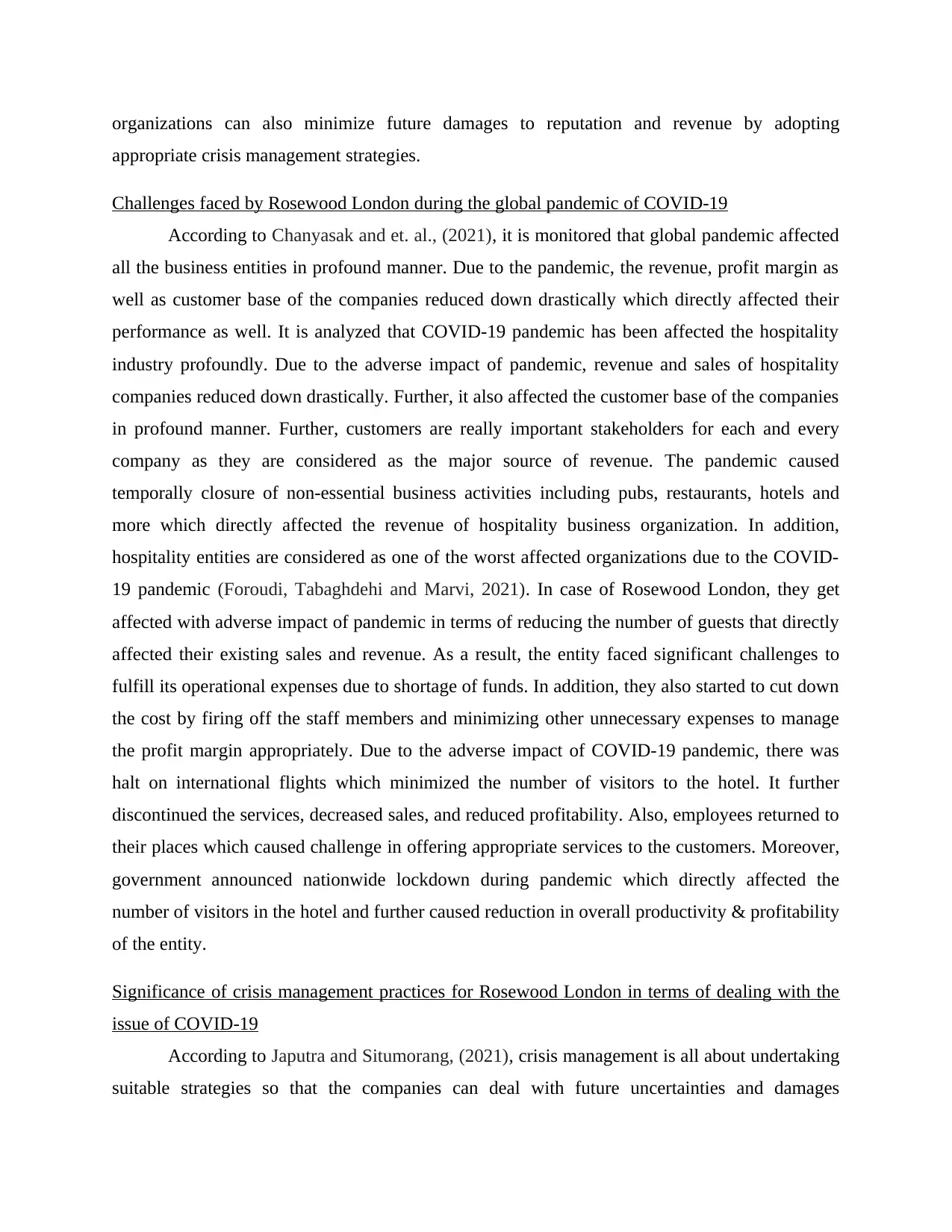
organizations can also minimize future damages to reputation and revenue by adopting
appropriate crisis management strategies.
Challenges faced by Rosewood London during the global pandemic of COVID-19
According to Chanyasak and et. al., (2021), it is monitored that global pandemic affected
all the business entities in profound manner. Due to the pandemic, the revenue, profit margin as
well as customer base of the companies reduced down drastically which directly affected their
performance as well. It is analyzed that COVID-19 pandemic has been affected the hospitality
industry profoundly. Due to the adverse impact of pandemic, revenue and sales of hospitality
companies reduced down drastically. Further, it also affected the customer base of the companies
in profound manner. Further, customers are really important stakeholders for each and every
company as they are considered as the major source of revenue. The pandemic caused
temporally closure of non-essential business activities including pubs, restaurants, hotels and
more which directly affected the revenue of hospitality business organization. In addition,
hospitality entities are considered as one of the worst affected organizations due to the COVID-
19 pandemic (Foroudi, Tabaghdehi and Marvi, 2021). In case of Rosewood London, they get
affected with adverse impact of pandemic in terms of reducing the number of guests that directly
affected their existing sales and revenue. As a result, the entity faced significant challenges to
fulfill its operational expenses due to shortage of funds. In addition, they also started to cut down
the cost by firing off the staff members and minimizing other unnecessary expenses to manage
the profit margin appropriately. Due to the adverse impact of COVID-19 pandemic, there was
halt on international flights which minimized the number of visitors to the hotel. It further
discontinued the services, decreased sales, and reduced profitability. Also, employees returned to
their places which caused challenge in offering appropriate services to the customers. Moreover,
government announced nationwide lockdown during pandemic which directly affected the
number of visitors in the hotel and further caused reduction in overall productivity & profitability
of the entity.
Significance of crisis management practices for Rosewood London in terms of dealing with the
issue of COVID-19
According to Japutra and Situmorang, (2021), crisis management is all about undertaking
suitable strategies so that the companies can deal with future uncertainties and damages
appropriate crisis management strategies.
Challenges faced by Rosewood London during the global pandemic of COVID-19
According to Chanyasak and et. al., (2021), it is monitored that global pandemic affected
all the business entities in profound manner. Due to the pandemic, the revenue, profit margin as
well as customer base of the companies reduced down drastically which directly affected their
performance as well. It is analyzed that COVID-19 pandemic has been affected the hospitality
industry profoundly. Due to the adverse impact of pandemic, revenue and sales of hospitality
companies reduced down drastically. Further, it also affected the customer base of the companies
in profound manner. Further, customers are really important stakeholders for each and every
company as they are considered as the major source of revenue. The pandemic caused
temporally closure of non-essential business activities including pubs, restaurants, hotels and
more which directly affected the revenue of hospitality business organization. In addition,
hospitality entities are considered as one of the worst affected organizations due to the COVID-
19 pandemic (Foroudi, Tabaghdehi and Marvi, 2021). In case of Rosewood London, they get
affected with adverse impact of pandemic in terms of reducing the number of guests that directly
affected their existing sales and revenue. As a result, the entity faced significant challenges to
fulfill its operational expenses due to shortage of funds. In addition, they also started to cut down
the cost by firing off the staff members and minimizing other unnecessary expenses to manage
the profit margin appropriately. Due to the adverse impact of COVID-19 pandemic, there was
halt on international flights which minimized the number of visitors to the hotel. It further
discontinued the services, decreased sales, and reduced profitability. Also, employees returned to
their places which caused challenge in offering appropriate services to the customers. Moreover,
government announced nationwide lockdown during pandemic which directly affected the
number of visitors in the hotel and further caused reduction in overall productivity & profitability
of the entity.
Significance of crisis management practices for Rosewood London in terms of dealing with the
issue of COVID-19
According to Japutra and Situmorang, (2021), crisis management is all about undertaking
suitable strategies so that the companies can deal with future uncertainties and damages
⊘ This is a preview!⊘
Do you want full access?
Subscribe today to unlock all pages.

Trusted by 1+ million students worldwide
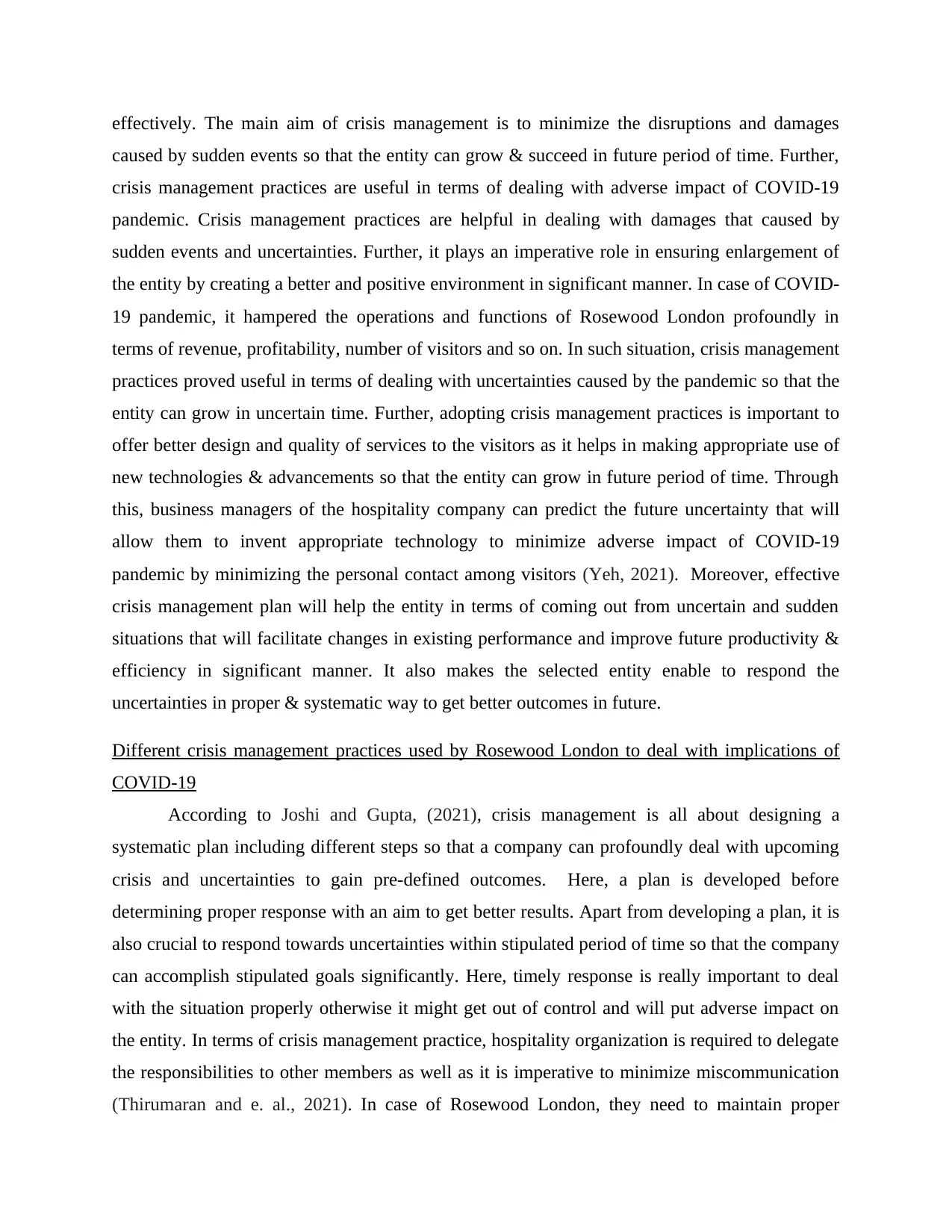
effectively. The main aim of crisis management is to minimize the disruptions and damages
caused by sudden events so that the entity can grow & succeed in future period of time. Further,
crisis management practices are useful in terms of dealing with adverse impact of COVID-19
pandemic. Crisis management practices are helpful in dealing with damages that caused by
sudden events and uncertainties. Further, it plays an imperative role in ensuring enlargement of
the entity by creating a better and positive environment in significant manner. In case of COVID-
19 pandemic, it hampered the operations and functions of Rosewood London profoundly in
terms of revenue, profitability, number of visitors and so on. In such situation, crisis management
practices proved useful in terms of dealing with uncertainties caused by the pandemic so that the
entity can grow in uncertain time. Further, adopting crisis management practices is important to
offer better design and quality of services to the visitors as it helps in making appropriate use of
new technologies & advancements so that the entity can grow in future period of time. Through
this, business managers of the hospitality company can predict the future uncertainty that will
allow them to invent appropriate technology to minimize adverse impact of COVID-19
pandemic by minimizing the personal contact among visitors (Yeh, 2021). Moreover, effective
crisis management plan will help the entity in terms of coming out from uncertain and sudden
situations that will facilitate changes in existing performance and improve future productivity &
efficiency in significant manner. It also makes the selected entity enable to respond the
uncertainties in proper & systematic way to get better outcomes in future.
Different crisis management practices used by Rosewood London to deal with implications of
COVID-19
According to Joshi and Gupta, (2021), crisis management is all about designing a
systematic plan including different steps so that a company can profoundly deal with upcoming
crisis and uncertainties to gain pre-defined outcomes. Here, a plan is developed before
determining proper response with an aim to get better results. Apart from developing a plan, it is
also crucial to respond towards uncertainties within stipulated period of time so that the company
can accomplish stipulated goals significantly. Here, timely response is really important to deal
with the situation properly otherwise it might get out of control and will put adverse impact on
the entity. In terms of crisis management practice, hospitality organization is required to delegate
the responsibilities to other members as well as it is imperative to minimize miscommunication
(Thirumaran and e. al., 2021). In case of Rosewood London, they need to maintain proper
caused by sudden events so that the entity can grow & succeed in future period of time. Further,
crisis management practices are useful in terms of dealing with adverse impact of COVID-19
pandemic. Crisis management practices are helpful in dealing with damages that caused by
sudden events and uncertainties. Further, it plays an imperative role in ensuring enlargement of
the entity by creating a better and positive environment in significant manner. In case of COVID-
19 pandemic, it hampered the operations and functions of Rosewood London profoundly in
terms of revenue, profitability, number of visitors and so on. In such situation, crisis management
practices proved useful in terms of dealing with uncertainties caused by the pandemic so that the
entity can grow in uncertain time. Further, adopting crisis management practices is important to
offer better design and quality of services to the visitors as it helps in making appropriate use of
new technologies & advancements so that the entity can grow in future period of time. Through
this, business managers of the hospitality company can predict the future uncertainty that will
allow them to invent appropriate technology to minimize adverse impact of COVID-19
pandemic by minimizing the personal contact among visitors (Yeh, 2021). Moreover, effective
crisis management plan will help the entity in terms of coming out from uncertain and sudden
situations that will facilitate changes in existing performance and improve future productivity &
efficiency in significant manner. It also makes the selected entity enable to respond the
uncertainties in proper & systematic way to get better outcomes in future.
Different crisis management practices used by Rosewood London to deal with implications of
COVID-19
According to Joshi and Gupta, (2021), crisis management is all about designing a
systematic plan including different steps so that a company can profoundly deal with upcoming
crisis and uncertainties to gain pre-defined outcomes. Here, a plan is developed before
determining proper response with an aim to get better results. Apart from developing a plan, it is
also crucial to respond towards uncertainties within stipulated period of time so that the company
can accomplish stipulated goals significantly. Here, timely response is really important to deal
with the situation properly otherwise it might get out of control and will put adverse impact on
the entity. In terms of crisis management practice, hospitality organization is required to delegate
the responsibilities to other members as well as it is imperative to minimize miscommunication
(Thirumaran and e. al., 2021). In case of Rosewood London, they need to maintain proper
Paraphrase This Document
Need a fresh take? Get an instant paraphrase of this document with our AI Paraphraser
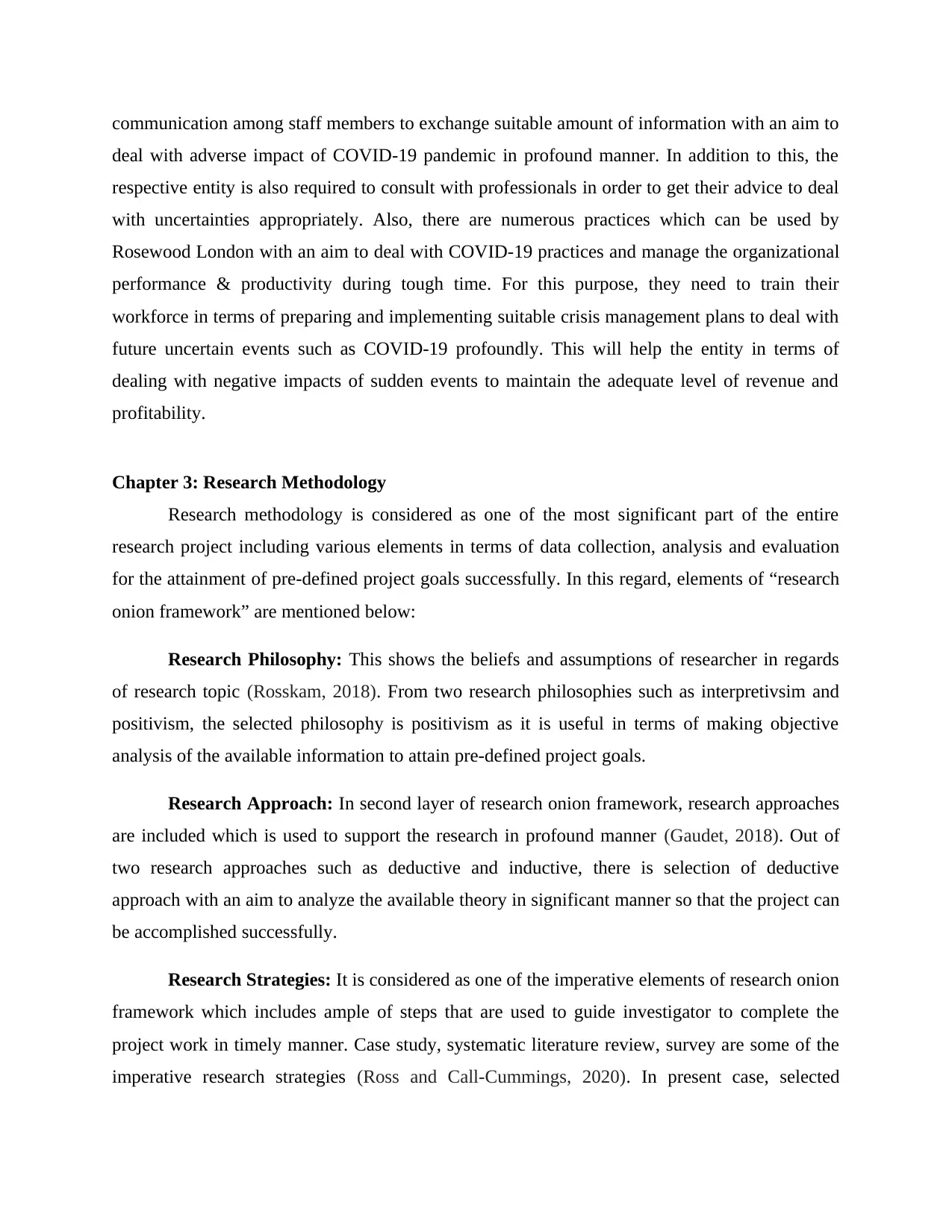
communication among staff members to exchange suitable amount of information with an aim to
deal with adverse impact of COVID-19 pandemic in profound manner. In addition to this, the
respective entity is also required to consult with professionals in order to get their advice to deal
with uncertainties appropriately. Also, there are numerous practices which can be used by
Rosewood London with an aim to deal with COVID-19 practices and manage the organizational
performance & productivity during tough time. For this purpose, they need to train their
workforce in terms of preparing and implementing suitable crisis management plans to deal with
future uncertain events such as COVID-19 profoundly. This will help the entity in terms of
dealing with negative impacts of sudden events to maintain the adequate level of revenue and
profitability.
Chapter 3: Research Methodology
Research methodology is considered as one of the most significant part of the entire
research project including various elements in terms of data collection, analysis and evaluation
for the attainment of pre-defined project goals successfully. In this regard, elements of “research
onion framework” are mentioned below:
Research Philosophy: This shows the beliefs and assumptions of researcher in regards
of research topic (Rosskam, 2018). From two research philosophies such as interpretivsim and
positivism, the selected philosophy is positivism as it is useful in terms of making objective
analysis of the available information to attain pre-defined project goals.
Research Approach: In second layer of research onion framework, research approaches
are included which is used to support the research in profound manner (Gaudet, 2018). Out of
two research approaches such as deductive and inductive, there is selection of deductive
approach with an aim to analyze the available theory in significant manner so that the project can
be accomplished successfully.
Research Strategies: It is considered as one of the imperative elements of research onion
framework which includes ample of steps that are used to guide investigator to complete the
project work in timely manner. Case study, systematic literature review, survey are some of the
imperative research strategies (Ross and Call-Cummings, 2020). In present case, selected
deal with adverse impact of COVID-19 pandemic in profound manner. In addition to this, the
respective entity is also required to consult with professionals in order to get their advice to deal
with uncertainties appropriately. Also, there are numerous practices which can be used by
Rosewood London with an aim to deal with COVID-19 practices and manage the organizational
performance & productivity during tough time. For this purpose, they need to train their
workforce in terms of preparing and implementing suitable crisis management plans to deal with
future uncertain events such as COVID-19 profoundly. This will help the entity in terms of
dealing with negative impacts of sudden events to maintain the adequate level of revenue and
profitability.
Chapter 3: Research Methodology
Research methodology is considered as one of the most significant part of the entire
research project including various elements in terms of data collection, analysis and evaluation
for the attainment of pre-defined project goals successfully. In this regard, elements of “research
onion framework” are mentioned below:
Research Philosophy: This shows the beliefs and assumptions of researcher in regards
of research topic (Rosskam, 2018). From two research philosophies such as interpretivsim and
positivism, the selected philosophy is positivism as it is useful in terms of making objective
analysis of the available information to attain pre-defined project goals.
Research Approach: In second layer of research onion framework, research approaches
are included which is used to support the research in profound manner (Gaudet, 2018). Out of
two research approaches such as deductive and inductive, there is selection of deductive
approach with an aim to analyze the available theory in significant manner so that the project can
be accomplished successfully.
Research Strategies: It is considered as one of the imperative elements of research onion
framework which includes ample of steps that are used to guide investigator to complete the
project work in timely manner. Case study, systematic literature review, survey are some of the
imperative research strategies (Ross and Call-Cummings, 2020). In present case, selected
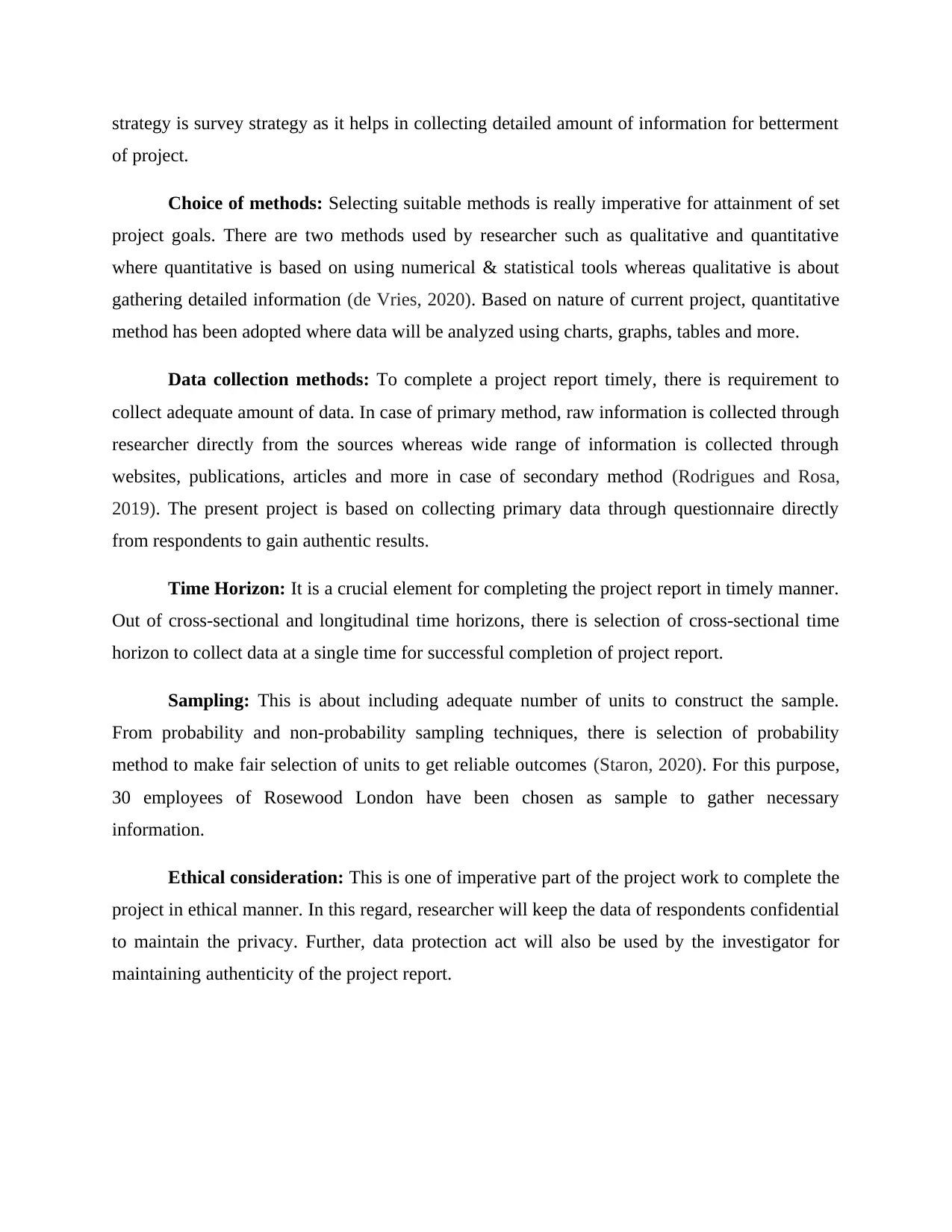
strategy is survey strategy as it helps in collecting detailed amount of information for betterment
of project.
Choice of methods: Selecting suitable methods is really imperative for attainment of set
project goals. There are two methods used by researcher such as qualitative and quantitative
where quantitative is based on using numerical & statistical tools whereas qualitative is about
gathering detailed information (de Vries, 2020). Based on nature of current project, quantitative
method has been adopted where data will be analyzed using charts, graphs, tables and more.
Data collection methods: To complete a project report timely, there is requirement to
collect adequate amount of data. In case of primary method, raw information is collected through
researcher directly from the sources whereas wide range of information is collected through
websites, publications, articles and more in case of secondary method (Rodrigues and Rosa,
2019). The present project is based on collecting primary data through questionnaire directly
from respondents to gain authentic results.
Time Horizon: It is a crucial element for completing the project report in timely manner.
Out of cross-sectional and longitudinal time horizons, there is selection of cross-sectional time
horizon to collect data at a single time for successful completion of project report.
Sampling: This is about including adequate number of units to construct the sample.
From probability and non-probability sampling techniques, there is selection of probability
method to make fair selection of units to get reliable outcomes (Staron, 2020). For this purpose,
30 employees of Rosewood London have been chosen as sample to gather necessary
information.
Ethical consideration: This is one of imperative part of the project work to complete the
project in ethical manner. In this regard, researcher will keep the data of respondents confidential
to maintain the privacy. Further, data protection act will also be used by the investigator for
maintaining authenticity of the project report.
of project.
Choice of methods: Selecting suitable methods is really imperative for attainment of set
project goals. There are two methods used by researcher such as qualitative and quantitative
where quantitative is based on using numerical & statistical tools whereas qualitative is about
gathering detailed information (de Vries, 2020). Based on nature of current project, quantitative
method has been adopted where data will be analyzed using charts, graphs, tables and more.
Data collection methods: To complete a project report timely, there is requirement to
collect adequate amount of data. In case of primary method, raw information is collected through
researcher directly from the sources whereas wide range of information is collected through
websites, publications, articles and more in case of secondary method (Rodrigues and Rosa,
2019). The present project is based on collecting primary data through questionnaire directly
from respondents to gain authentic results.
Time Horizon: It is a crucial element for completing the project report in timely manner.
Out of cross-sectional and longitudinal time horizons, there is selection of cross-sectional time
horizon to collect data at a single time for successful completion of project report.
Sampling: This is about including adequate number of units to construct the sample.
From probability and non-probability sampling techniques, there is selection of probability
method to make fair selection of units to get reliable outcomes (Staron, 2020). For this purpose,
30 employees of Rosewood London have been chosen as sample to gather necessary
information.
Ethical consideration: This is one of imperative part of the project work to complete the
project in ethical manner. In this regard, researcher will keep the data of respondents confidential
to maintain the privacy. Further, data protection act will also be used by the investigator for
maintaining authenticity of the project report.
⊘ This is a preview!⊘
Do you want full access?
Subscribe today to unlock all pages.

Trusted by 1+ million students worldwide
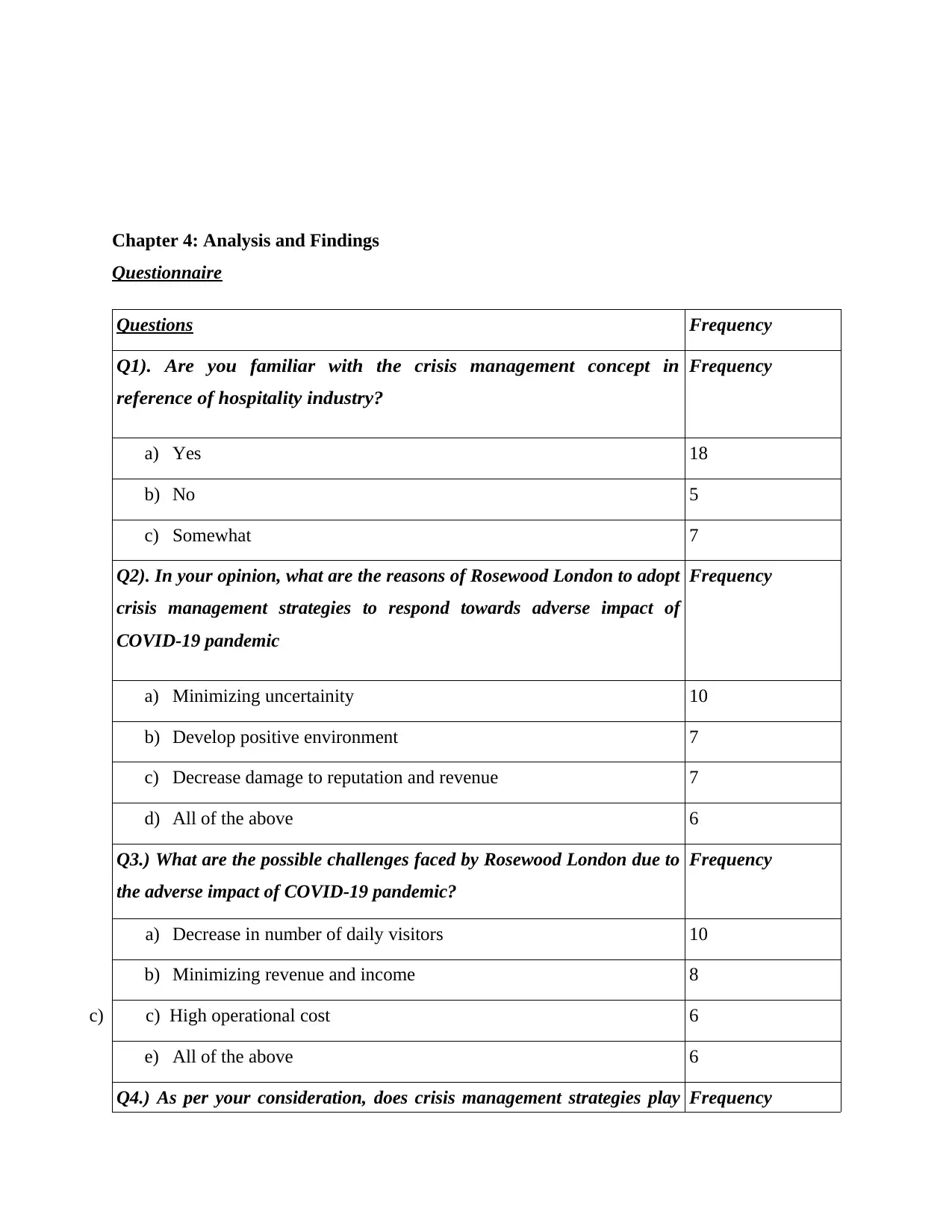
Chapter 4: Analysis and Findings
Questionnaire
Questions Frequency
Q1). Are you familiar with the crisis management concept in
reference of hospitality industry?
Frequency
a) Yes 18
b) No 5
c) Somewhat 7
Q2). In your opinion, what are the reasons of Rosewood London to adopt
crisis management strategies to respond towards adverse impact of
COVID-19 pandemic
Frequency
a) Minimizing uncertainity 10
b) Develop positive environment 7
c) Decrease damage to reputation and revenue 7
d) All of the above 6
Q3.) What are the possible challenges faced by Rosewood London due to
the adverse impact of COVID-19 pandemic?
Frequency
a) Decrease in number of daily visitors 10
b) Minimizing revenue and income 8
c) c) High operational cost 6
e) All of the above 6
Q4.) As per your consideration, does crisis management strategies play Frequency
Questionnaire
Questions Frequency
Q1). Are you familiar with the crisis management concept in
reference of hospitality industry?
Frequency
a) Yes 18
b) No 5
c) Somewhat 7
Q2). In your opinion, what are the reasons of Rosewood London to adopt
crisis management strategies to respond towards adverse impact of
COVID-19 pandemic
Frequency
a) Minimizing uncertainity 10
b) Develop positive environment 7
c) Decrease damage to reputation and revenue 7
d) All of the above 6
Q3.) What are the possible challenges faced by Rosewood London due to
the adverse impact of COVID-19 pandemic?
Frequency
a) Decrease in number of daily visitors 10
b) Minimizing revenue and income 8
c) c) High operational cost 6
e) All of the above 6
Q4.) As per your consideration, does crisis management strategies play Frequency
Paraphrase This Document
Need a fresh take? Get an instant paraphrase of this document with our AI Paraphraser
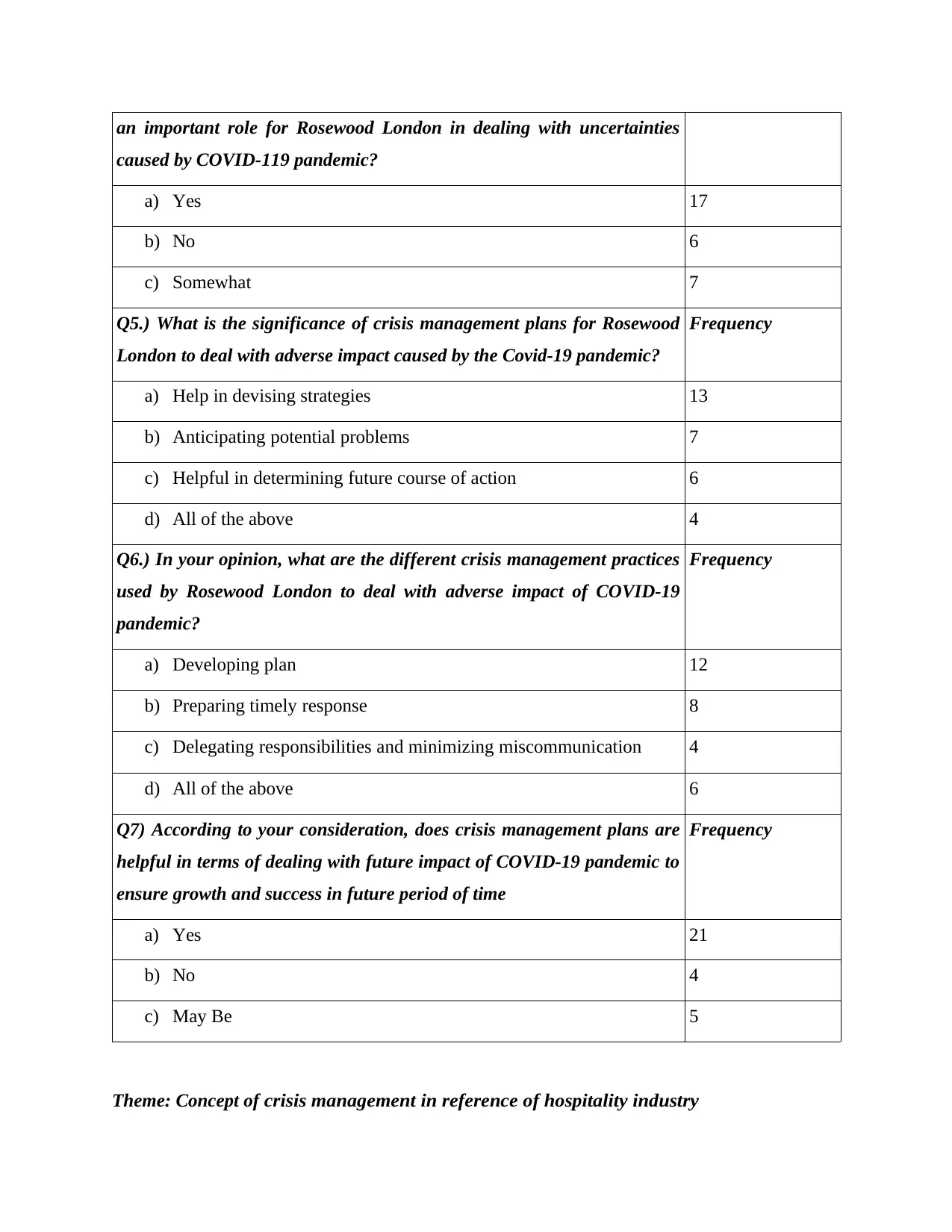
an important role for Rosewood London in dealing with uncertainties
caused by COVID-119 pandemic?
a) Yes 17
b) No 6
c) Somewhat 7
Q5.) What is the significance of crisis management plans for Rosewood
London to deal with adverse impact caused by the Covid-19 pandemic?
Frequency
a) Help in devising strategies 13
b) Anticipating potential problems 7
c) Helpful in determining future course of action 6
d) All of the above 4
Q6.) In your opinion, what are the different crisis management practices
used by Rosewood London to deal with adverse impact of COVID-19
pandemic?
Frequency
a) Developing plan 12
b) Preparing timely response 8
c) Delegating responsibilities and minimizing miscommunication 4
d) All of the above 6
Q7) According to your consideration, does crisis management plans are
helpful in terms of dealing with future impact of COVID-19 pandemic to
ensure growth and success in future period of time
Frequency
a) Yes 21
b) No 4
c) May Be 5
Theme: Concept of crisis management in reference of hospitality industry
caused by COVID-119 pandemic?
a) Yes 17
b) No 6
c) Somewhat 7
Q5.) What is the significance of crisis management plans for Rosewood
London to deal with adverse impact caused by the Covid-19 pandemic?
Frequency
a) Help in devising strategies 13
b) Anticipating potential problems 7
c) Helpful in determining future course of action 6
d) All of the above 4
Q6.) In your opinion, what are the different crisis management practices
used by Rosewood London to deal with adverse impact of COVID-19
pandemic?
Frequency
a) Developing plan 12
b) Preparing timely response 8
c) Delegating responsibilities and minimizing miscommunication 4
d) All of the above 6
Q7) According to your consideration, does crisis management plans are
helpful in terms of dealing with future impact of COVID-19 pandemic to
ensure growth and success in future period of time
Frequency
a) Yes 21
b) No 4
c) May Be 5
Theme: Concept of crisis management in reference of hospitality industry
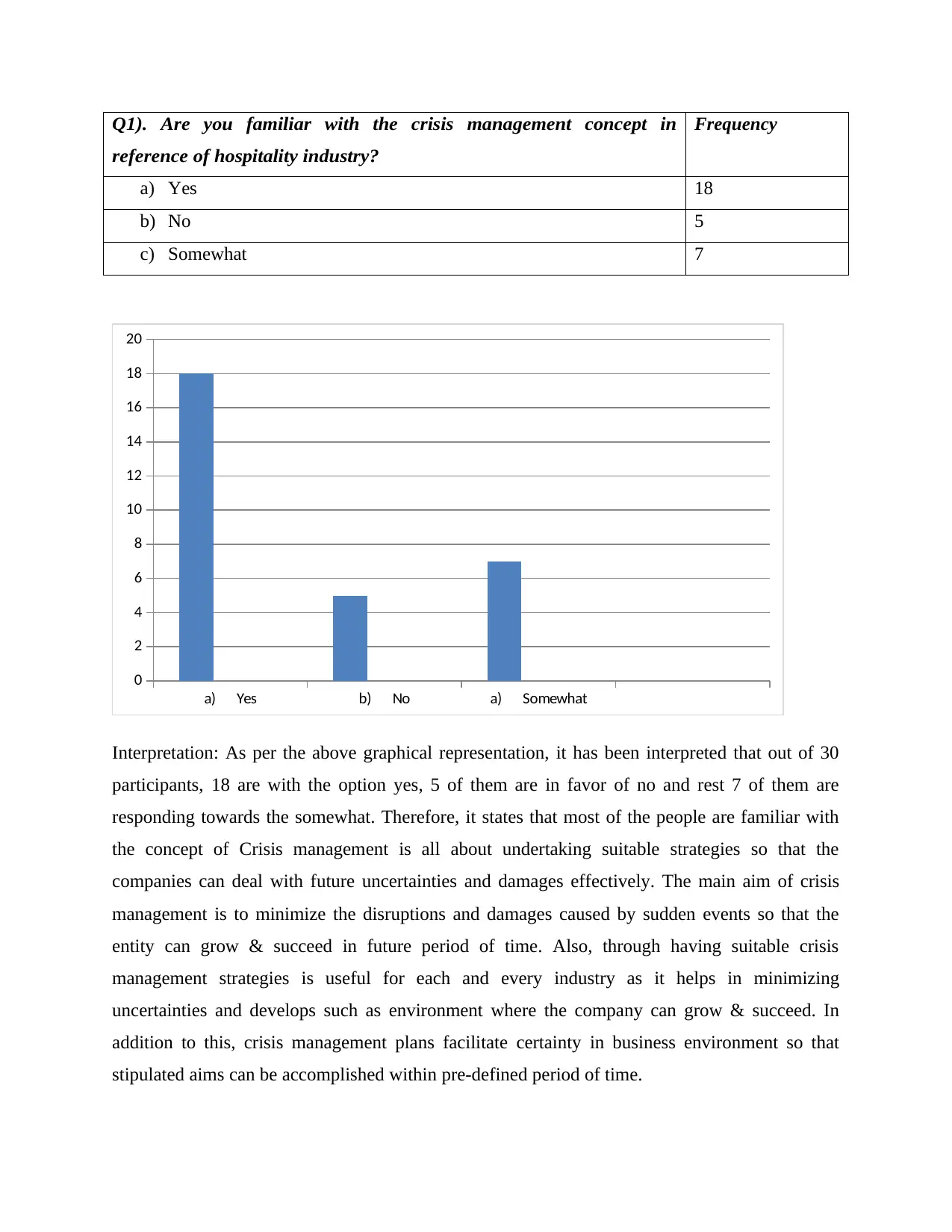
Q1). Are you familiar with the crisis management concept in
reference of hospitality industry?
Frequency
a) Yes 18
b) No 5
c) Somewhat 7
a) Yes b) No a) Somewhat
0
2
4
6
8
10
12
14
16
18
20
Interpretation: As per the above graphical representation, it has been interpreted that out of 30
participants, 18 are with the option yes, 5 of them are in favor of no and rest 7 of them are
responding towards the somewhat. Therefore, it states that most of the people are familiar with
the concept of Crisis management is all about undertaking suitable strategies so that the
companies can deal with future uncertainties and damages effectively. The main aim of crisis
management is to minimize the disruptions and damages caused by sudden events so that the
entity can grow & succeed in future period of time. Also, through having suitable crisis
management strategies is useful for each and every industry as it helps in minimizing
uncertainties and develops such as environment where the company can grow & succeed. In
addition to this, crisis management plans facilitate certainty in business environment so that
stipulated aims can be accomplished within pre-defined period of time.
reference of hospitality industry?
Frequency
a) Yes 18
b) No 5
c) Somewhat 7
a) Yes b) No a) Somewhat
0
2
4
6
8
10
12
14
16
18
20
Interpretation: As per the above graphical representation, it has been interpreted that out of 30
participants, 18 are with the option yes, 5 of them are in favor of no and rest 7 of them are
responding towards the somewhat. Therefore, it states that most of the people are familiar with
the concept of Crisis management is all about undertaking suitable strategies so that the
companies can deal with future uncertainties and damages effectively. The main aim of crisis
management is to minimize the disruptions and damages caused by sudden events so that the
entity can grow & succeed in future period of time. Also, through having suitable crisis
management strategies is useful for each and every industry as it helps in minimizing
uncertainties and develops such as environment where the company can grow & succeed. In
addition to this, crisis management plans facilitate certainty in business environment so that
stipulated aims can be accomplished within pre-defined period of time.
⊘ This is a preview!⊘
Do you want full access?
Subscribe today to unlock all pages.

Trusted by 1+ million students worldwide
1 out of 23
Related Documents
Your All-in-One AI-Powered Toolkit for Academic Success.
+13062052269
info@desklib.com
Available 24*7 on WhatsApp / Email
![[object Object]](/_next/static/media/star-bottom.7253800d.svg)
Unlock your academic potential
Copyright © 2020–2026 A2Z Services. All Rights Reserved. Developed and managed by ZUCOL.





